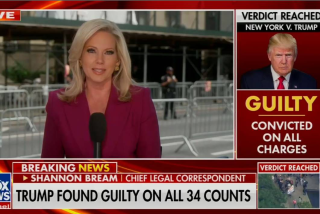Court TV Quietly Winning a Crucial Trial--Gaining Viewers
- Share via
To people who haven’t been paying attention, the spotlight now shining on Court TV due to its bid to televise the federal trial of terrorism suspect Zacarias Moussaoui may seem like the channel’s brightest moment since O.J. Simpson.
But TV industry watchers will tell you the real story of Court TV is the remarkable, if quietly won, success it has achieved in recent years without a circus-level trial to show.
A change in programming strategy, begun shortly after founder Steven Brill sold his stake to his big-media partners in 1997, has seen Court TV increase prime-time ratings almost tenfold. Since then, it has moved from a mid-level cable channel, available in about 30 million homes, to a basic-cable mainstay in close to 70 million homes. Court TV is among the fastest-growing channels and is coming off its best month ever in December.
“If they were a newly launched network, it would be an amazing story,” says Gary Lico, president and CEO of CableReady, a developer and distributor of programming to cable networks, including Court TV. “But the fact that it is a turnaround is a more amazing story. It’s pretty tough to move the needle that much in that short a period of time.”
What had been a niche channel closer in mission to C-SPAN than TNT is now flirting with cracking cable’s top 10.
The fundamental change was similar to those enacted at other cable channels, including MTV and, just recently, CNN, both of which increased their audience by doing less of the thing for which they were best known.
Founded in 1991, Court TV used to rely on putting American jurisprudence on TV and using the trials of the moment to fill its programming. Just six weeks into the channel’s existence, the William Kennedy Smith rape trial helped put Court TV on the cultural map.
“In some ways it was early reality television,” says Herbert Terry, an Indiana University telecommunications professor who studies media and the law. “It was successful at representing the drama of real life and people in stressful situations before we invented ‘Survivor.’ It’s more real than reality TV.”
And Terry says he can’t disagree with Court TV’s claim to have performed a valuable civic function over the years. “While there’s clearly a tendency of the service to choose extraordinary cases if they can,” he says, “I don’t think it’s entirely disingenuous for them to say, ‘We’ve helped educate people.’
“The other impact has been for the most part positive on the judicial system and the opening up of courts to cameras.”
CEO Sought Steady Prime-Time Lineup
But when he took over Court TV three years ago, new CEO Henry Schleiff moved to de-emphasize some of that signature courtroom coverage by developing a steady prime-time lineup whose ratings would not be dependent on how “hot” the trial of the moment was.
Schleiff hired ex-judge and Fox News Channel anchor Catherine Crier to host an evening talk show, spent the cash of owning partners Time Warner AOL and Liberty Media for reruns of some big-name, syndicated criminal justice shows, including “Homicide: Life on the Street” and “NYPD Blue,” and developed some documentary series, most notably Court TV’s signature series, “Forensic Files.”
“It didn’t take a rocket scientist to see that there was a huge opportunity there,” Schleiff says. “When I walked in, my first budget presentation showed a prime-time audience of 38,000 homes. We could have done a budget presentation for each one.”
As for ratings, “we literally were doing a 0.1, which this phone call would get.” For December, Court TV did a 0.8 in prime time, and the number of homes in the month’s last week was up to 734,000.
Brill, now a columnist for Newsweek, is cautious in assessing the strategy begun after he left.
“I never wanted to do things like show reruns of crime dramas, because then you’re just doing something that any other channel could do,” Brill says. “The danger is it puts them in the business of bidding against everyone else. You also have to figure out with some precision what you pay for each ratings point.”
(Schleiff says the station is making money “if you don’t count what we have expended on launch support”--expensive promotions that help bring bigger audiences.)
The station’s boosters argue that, if you look at the trials it has chosen to cover, Court TV has always had commercial motives, and the new direction is only a firmer emphasis of that fact.
The question some observers have is how far the dilution will go. Will Court TV further turn away from trial coverage and analysis, now the mainstay of its daytime programming? Schleiff says no.
“It’s what distinguishes Court TV,” he says. “The combination is what makes us different.”
Judge Leonie Brinkema will conduct a hearing Wednesday in U.S. District Court in Alexandria, Va., on the channel’s request that the court allow cameras in the Moussaoui trial, scheduled for October.
Debating Allowing Cameras in Courtroom
Defense lawyers have sided with Court TV, arguing that cameras will show the world the trial is being conducted fairly. Prosecutors said a television presence could make it easier for terrorists to retaliate against witnesses.
Most state courts allow television cameras, often at the discretion of individual judges, and studies have suggested cameras do not have the distorting effect their opponents fear.
“As controversial as some of them have been,” says Indiana University’s Terry, “they’ve by and large been positive demonstrations that you can do this and the cameras don’t fundamentally screw things up. If O.J. got off, it was by and large because of cunning lawyers who made a positive appeal to the jury and not because of the presence of cameras.”
“In every case we did,” agrees Brill, “I could make the argument that televising the trial was good for justice, including O.J. Simpson.” In William Kennedy Smith as in Rodney King, for instance, people who actually watched tended to be more sympathetic than the wider public, with whom the verdicts were largely unpopular, he says, and the Simpson case pointed up problems in the legal system.
And the development of ever less intrusive technology, he adds, “sort of forces the debate to be what it should be, which is: Should anyone who wants to be able to watch a trial?”
But with some minor exceptions, the federal courts continue to prohibit them. Court TV is arguing that prohibition is unconstitutional because, in essence, the framers intended for trials to be public events. Terry says he is unsure whether the judge will allow the Moussaoui case to be televised but expects that the time is not too far off when even federal rules are relaxed significantly.
However the Moussaoui decision goes, the controversy the request has engendered has been good public relations for Court TV. Pushing hard for the right to televise this high-profile trial only re-emphasizes in people’s minds the link between Court TV and criminal justice.
*
Steve Johnson is media critic at the Chicago Tribune, a Tribune company.
More to Read
The biggest entertainment stories
Get our big stories about Hollywood, film, television, music, arts, culture and more right in your inbox as soon as they publish.
You may occasionally receive promotional content from the Los Angeles Times.










